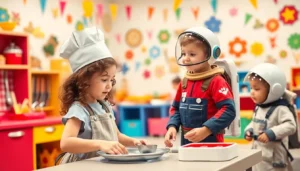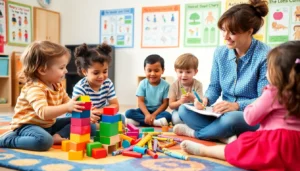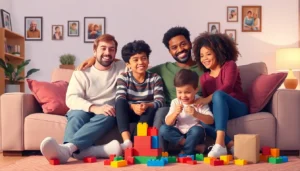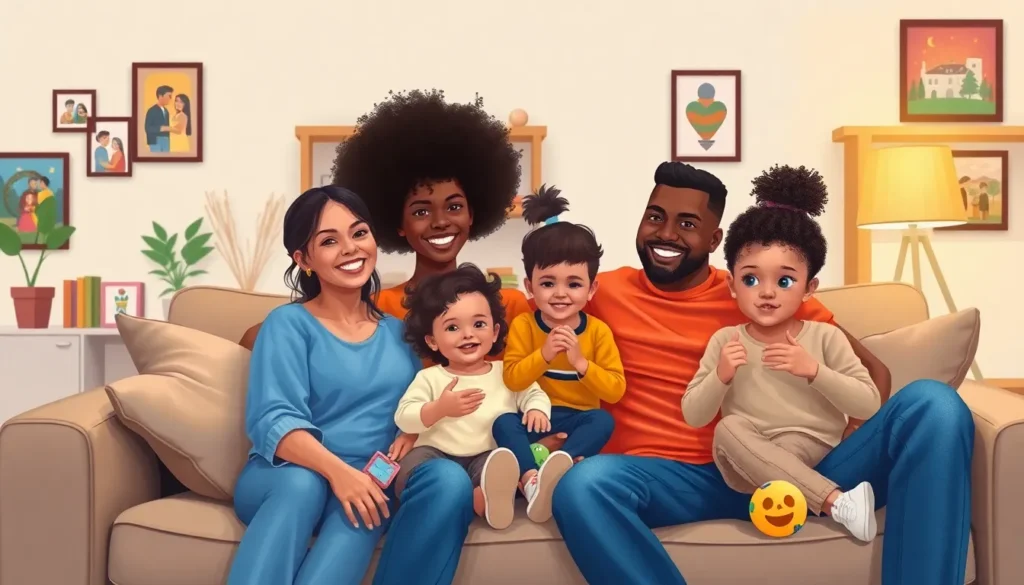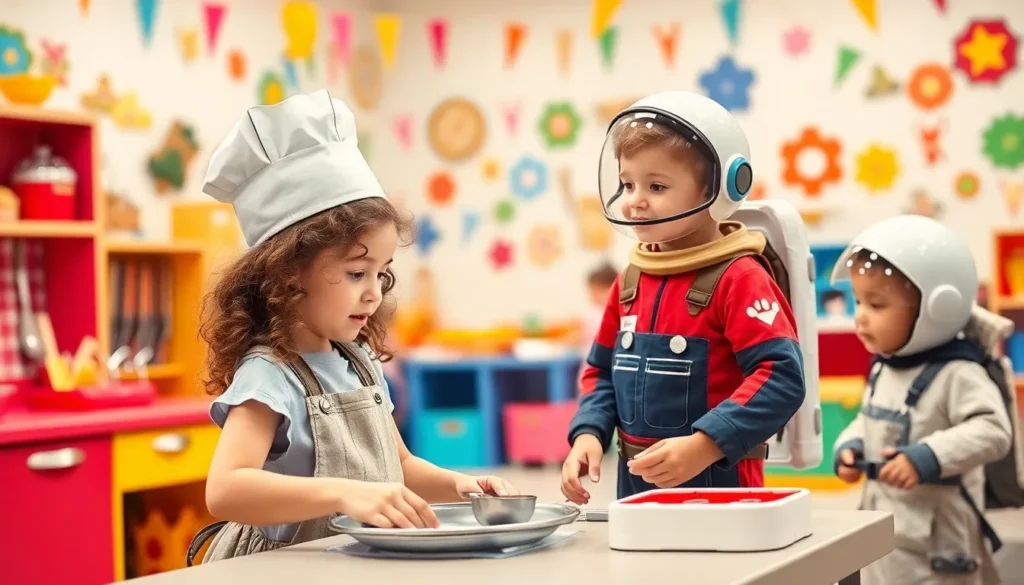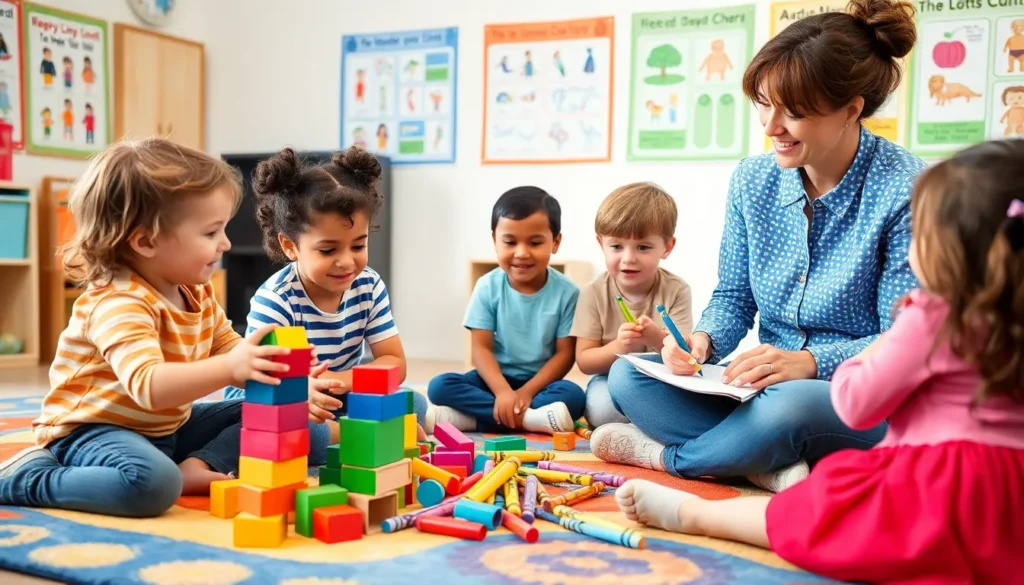Table of Contents
ToggleIn a world where toddlers wield crayons like modern-day Picassos and building blocks become skyscrapers of imagination, early childhood education through play is nothing short of magical. It’s not just about keeping kids entertained while parents sip their coffee in peace; it’s a vital way for young minds to explore, learn, and grow. Who knew that a simple game of pretend could spark creativity and critical thinking skills?
Overview of Early Childhood Education Learning Through Play
Early childhood education through play encompasses a variety of interactive activities that enhance learning. Children engage in play-based learning, enjoying experiences like drawing and building, which stimulate their imaginative capabilities. Through these activities, they develop critical thinking skills essential for problem-solving.
Learning through play occurs within structured environments where educators guide exploration. Teachers often create learning stations filled with resources, fostering curiosity. These environments encourage children to interact freely with educational materials, allowing them to experiment and discover new concepts naturally.
Social interaction plays a significant role in this educational framework. When children collaborate on projects, they develop communication skills and empathy toward peers. Additionally, cooperative play promotes teamwork, highlighting the importance of social bonds in the learning process.
Research shows that play-based education leads to improved retention of knowledge. Engaging in hands-on activities helps children connect with the material, making it more memorable. Studies indicate that students in play-based programs exhibit better academic performance in later years compared to those in traditional settings.
Assessment methods in early childhood education also reflect the value of play. Observational assessments gauge a child’s progress through their interactions during play. These assessments offer insight into each child’s individual learning style and interests, allowing educators to tailor their teaching methods accordingly.
Ultimately, early childhood education through play provides a rich foundation for lifelong learning. Prioritizing play allows children to learn at their own pace while enjoying the process. This approach nurtures not only intellectual growth but also emotional and social development, creating well-rounded individuals ready for future challenges.
Benefits of Learning Through Play
Learning through play significantly impacts emotional, social, and cognitive development in young children. Engaging in playful activities promotes holistic growth and enhances essential skills.
Cognitive Development
Cognitive development thrives through play, as children solve problems and engage in critical thinking. Activities like building with blocks or solving puzzles challenge their minds, fostering creativity and innovation. Studies show that play-based learning enhances memory retention and reinforces concepts in various subjects. Various scenarios encourage exploration and experimentation, allowing children to understand cause and effect. As they manipulate objects and ideas, they develop strong reasoning skills and a love for learning.
Social Skills Enhancement
Social skills flourish in play-based environments where collaboration is key. Group activities allow children to work together, share ideas, and negotiate roles, strengthening their communication. Empathy develops as they learn to consider the feelings and perspectives of peers during cooperative play. Playing alongside others builds trust and encourages friendship, essential for emotional intelligence. Interactions in these settings prepare children for future social situations, enhancing their ability to navigate diverse environments. Hence, play becomes a platform for mastering vital social competencies.
Key Principles of Early Childhood Education Learning Through Play
Early childhood education thrives on play, emphasizing hands-on experiences that engage young children. Play serves as a primary tool for effective learning and development.
Active Participation
Active participation defines play-based learning. Children become involved in activities, making choices and directing their learning experiences. They express ideas through movement, speech, and creativity, solidifying their understanding of concepts. Hands-on engagement enhances retention rates, helping children grasp and apply new knowledge. In settings where participation is encouraged, children develop critical thinking skills and become more confident learners. Teachers often facilitate this engagement, guiding activities while allowing for child-led exploration.
Exploration and Discovery
Exploration and discovery fuel children’s natural curiosity. Learning environments are crafted to invite investigation, featuring diverse materials that stimulate interest. Children learn through trial and error, identifying cause-and-effect relationships as they navigate challenges. These moments foster problem-solving abilities and cognitive growth. Discovery-based play allows children to connect real-world experiences with academic concepts, making learning meaningful. As they explore, they develop perseverance and adaptability, essential skills for future learning. This approach nurtures an inquisitive mindset that serves them throughout life.
Effective Strategies for Implementing Play in Education
Implementing play in early childhood education involves a balance of structured and free play opportunities. Both approaches contribute significantly to developmental growth.
Structured Play Activities
Structured play activities involve guided experiences designed to enhance specific skills. Educators create learning stations with focused tasks like building blocks and art projects. Each station promotes exploration while aligning with learning objectives. Adding elements such as themes or challenges can keep children engaged. Groups can collaborate on projects, fostering teamwork and problem-solving skills. These activities support cognitive development by encouraging critical thinking and creativity. Utilizing props or educational materials further enriches the experience, allowing children to learn through hands-on exploration.
Free Play Opportunities
Free play opportunities allow children to direct their learning without a predefined structure. During free play, kids explore their interests and engage in imaginative scenarios. This autonomy builds confidence and fosters creativity. Environments should be safe and inviting, filled with diverse materials that spark curiosity. Interaction with peers during free play nurtures social skills like communication and empathy. Children learn to negotiate and resolve conflicts through unstructured play. Observing their choices can provide valuable insights into their preferences and learning styles, informing future educational strategies.
Embracing play as a fundamental aspect of early childhood education transforms how children learn and grow. Through engaging activities, they not only develop essential cognitive and social skills but also cultivate a love for learning that lasts a lifetime.
The balance between structured and free play creates an enriching environment where curiosity thrives and creativity flourishes. Observational assessments during these playful moments provide valuable insights into each child’s unique learning style, allowing educators to tailor their approaches effectively.
Ultimately, prioritizing play in early education lays a robust foundation for future academic success and personal development, empowering children to navigate their world with confidence and enthusiasm.


